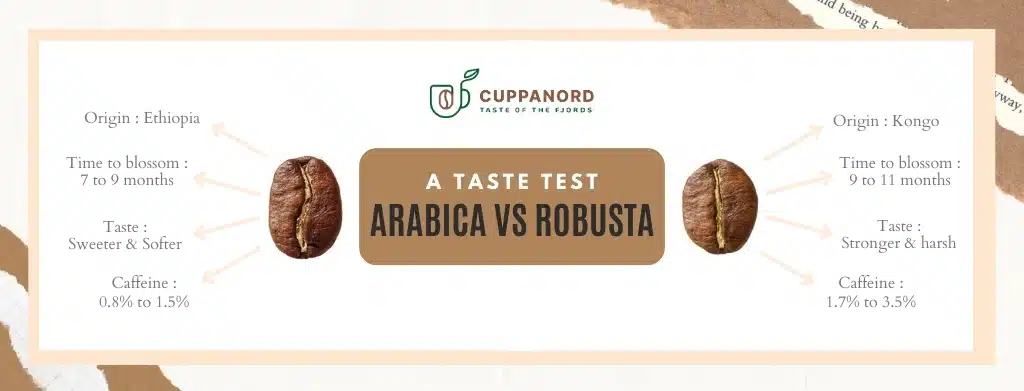Coffee is more than just a beverage; it’s a global cultural phenomenon that plays a significant role in Coffee Production in the daily lives of millions around the world. Beyond its stimulating effects, coffee is a social lubricant, a source of comfort, and a ceremonial start to many people’s days. The rich aroma and distinct flavours of coffee have made it ubiquitous in diverse cultures, transcending geographical and social boundaries.
Importance of Coffee in Our Daily Lives:
Beyond its caffeine kick, coffee fosters social connections, serves as a morning ritual, and delights the palate with its diverse flavours. It’s a cultural constant that brings people together, providing comfort and a sense of community.
Environmental Impact of Coffee Production
Deforestation:
Clearing of land: To create space for coffee plantations, large areas of forests are often cleared, leading to deforestation.
Loss of biodiversity: This process destroys natural habitats, causing a decline in biodiversity as native flora and fauna lose their homes.
Water Pollution:
Chemical use: Coffee cultivation frequently involves the application of chemical fertilizers and pesticides to enhance crop yield and control pests.
Runoff contamination: Rain or irrigation can wash these chemicals into nearby water sources, causing pollution and potential harm to aquatic ecosystems.
Greenhouse Gas Emissions:
Energy consumption: Throughout the coffee production chain, from cultivation to processing and shipping, energy is consumed. As a result, greenhouse gases are released, which exacerbates climate change.
Climate impact: The overall carbon footprint of coffee production adds to the global warming effect and exacerbates climate-related issues.
Sustainability in Coffee Production
Shade-Grown Coffee
Preserving biodiversity and wildlife habitat: Shade-grown coffee provides a more natural environment for plants and animals. The canopy of trees creates a habitat for various species, contributing to overall biodiversity.
Reduced need for chemical inputs: The shade from trees helps maintain a balanced ecosystem, reducing the reliance on synthetic pesticides and fertilizers. This benefits both the environment and the health of coffee plants.
Organic Farming Practices:
Avoidance of synthetic pesticides and fertilizers:
Organic farming avoids the use of synthetic chemicals, promoting a healthier and more sustainable approach to agriculture. This reduces the environmental impact and potential harm to ecosystems.
Enhancing soil health and protecting ecosystems:
Organic practices focus on building soil fertility through natural means, promoting biodiversity and preventing soil degradation.
Fair Trade Coffee:
Ensuring fair wages and working conditions for farmers:
Fairtrade certification guarantees that coffee farmers receive fair prices for their products, ensuring a decent standard of living. This helps address social issues such as poverty and promotes a more equitable distribution of wealth.
Supporting social and economic development in coffee-growing regions:
Fairtrade initiatives often include community development projects, such as building schools or healthcare facilities, which contribute to the overall well-being of the local population.
Direct Trade Coffee:
Establishing direct relationships between farmers and buyers:
Direct trade fosters closer connections between coffee producers and buyers, promoting transparency in the supply chain. This allows for better communication and understanding of the challenges faced by farmers.
Promoting transparency and fair prices for farmers:
By eliminating intermediaries, direct trade often results in higher prices paid directly to farmers, ensuring a more equitable distribution of income.
How Individuals Can Contribute to Mitigating the Impact

Sustainable Coffee Pods
A Brief Overview of Sustainable Coffee Pods
If you’re concerned about the environment, choosing sustainable coffee pods is a great alternative to regular single-use ones. The problem with conventional pods is that they can worsen environmental issues since they don’t break down naturally. On the other hand, sustainable coffee pods are made with eco-friendly ingredients and manufacturing methods, aiming to minimize the environmental impact caused by coffee consumption. By opting for these pods, you can enjoy your favourite coffee guilt-free!
Benefits and Advantages of Using Sustainable Coffee Pods:
Reduced Environmental Impact: Sustainable coffee pods are typically made from biodegradable or recyclable materials, reducing the amount of plastic waste in landfills.
Support for Sustainable Practices: Choosing sustainable coffee pods supports the adoption of environmentally responsible practices in the coffee industry, encouraging companies to prioritize eco-friendly alternatives.
Preservation of Resources: Some sustainable coffee pods are designed to be compatible with composting, allowing for the extraction of valuable nutrients from the used pods and contributing to soil health.
Energy Efficiency: Sustainable pod production often involves energy-efficient processes and the use of renewable energy sources, further reducing the overall environmental impact.
Tips for Choosing Sustainable Coffee Pod Brands:
Material Composition: Look for pods made from biodegradable materials such as plant-based plastics, paper, or compostable materials to minimize environmental impact.
Certifications: Seek certifications such as “Compostable,” “Biodegradable,” or “Certified Organic” to ensure that the coffee pods meet recognized sustainability standards.
Origin of Coffee: Choose brands that prioritize ethically sourced and sustainably grown coffee beans, ensuring that environmental and social aspects are considered throughout the production chain.
Packaging: Consider the overall packaging of the coffee pods, opting for brands that use minimal and eco-friendly packaging materials.
How to Properly Dispose of Coffee Pods for Minimal Environmental Impact:
Composting: If the coffee pods are labelled as compostable, they can be disposed of in compost bins. Composting allows the organic material to break down naturally, contributing to nutrient-rich soil.
Recycling: Check if the coffee pods are recyclable. Some pods are made from materials that can be recycled, but it’s essential to separate the components properly before recycling.
Terracycling Programs: Some companies offer Terracycling programs where used coffee pods can be sent back to the manufacturer for proper recycling. Check if the brand you choose participates in such programs.
Local Recycling Guidelines: Follow local recycling guidelines and regulations. Not all regions have the same recycling capabilities, so it’s essential to understand how to dispose of the pods properly in your area.
Sustainable Coffee Drip Bags
Coffee drip bags are a convenient and portable method for making coffee, especially when traditional brewing equipment is not readily available. These bags consist of ground coffee enclosed in a filter bag with hangers that allow them to be suspended over a cup. In recent years, there has been a growing interest in promoting coffee drip bags as a more sustainable alternative to single-use coffee drip bags.
The sustainability aspect of coffee drip bags often lies in the materials used for the bags and the reduction of overall waste. Many coffee drip bag manufacturers prioritize eco-friendly materials for the filter bags, making them biodegradable or compostable. Additionally, the packaging for individual drip bags can be designed to minimize environmental impact.
Advantages of Using Coffee Drip Bags:
Reduced Packaging Waste: Sustainable Coffee drip bags typically generate less waste compared to single-use coffee pods as they often come in minimal packaging, and the bags themselves are more environmentally friendly.
Portability and Convenience: Drip bags are easy to carry and require minimal equipment, making them a convenient option for travellers or individuals on the go.
Versatility: Coffee drip bags can be used with any cup, mug, or even a thermos. This versatility makes them suitable for various settings and situations.
Customizable Brewing: Users have control over the brewing time and water-to-coffee ratio, allowing for a more personalized and potentially enhanced coffee experience.
How to Use and Enjoy Coffee Drip Bags Responsibly:
Choose Sustainable Brands: Opt for coffee drip bags from brands that prioritize sustainability. Look for products made with eco-friendly materials and responsible packaging.
Proper Disposal: If the coffee drip bags are labelled as biodegradable or compostable, dispose of them in a compost bin instead of regular trash. Ensure that you follow local composting guidelines.
Minimize Additional Waste: Consider bringing a reusable cup or mug when using coffee drip bags to minimize additional waste. This also ensures you have a suitable container for brewing.
Reuse the Bags: Some brands design their drip bags for reuse. Check the packaging or manufacturer’s instructions to see if the bags can be used for multiple brewing sessions.
Mindful Water Usage: Use water efficiently during the brewing process. Avoid excessive water wastage, especially in situations where water resources may be limited.
Sustainability and Coffee
Certification Programs (e.g., Rainforest Alliance, UTZ Certified):
Certification programs play a crucial role in promoting sustainable coffee practices. Entities like Rainforest Alliance and UTZ Certified set standards for environmental, social, and economic sustainability in coffee production. Farmers and companies adhering to these standards receive certification, providing consumers assurance that the coffee they purchase meets certain sustainability criteria.
Consumer Awareness and Educated Choices:
Consumer awareness is pivotal for driving sustainability in the coffee industry. Informed consumers make educated choices by seeking products with certifications or labels indicating sustainable practices. By understanding the impact of their choices, consumers influence the market and encourage the adoption of more sustainable practices by coffee producers and brands.
Supporting Coffee Brands and Companies with Sustainable Practices:
Choosing to support coffee brands and companies committed to sustainable practices is a direct way for consumers to contribute to a more eco-friendly industry. This support incentivizes businesses to prioritize environmental conservation, ethical sourcing, and fair labour practices, fostering a positive impact on both the environment and coffee-producing communities.
Collaborative Initiatives Towards a Greener Coffee Industry:
When it comes to sustainable coffee, working together is the key. This means coffee producers, brands, governments, NGOs, and even us consumers need to team up. By joining forces, we can tackle the underlying problems, encourage responsible practices, and devise long-lasting strategies to ensure the coffee supply chain remains sustainable for years to come. This collective effort not only strengthens the industry but also ensures we are being mindful of our environment.
Conclusion
In conclusion, our daily coffee indulgence isn’t without environmental impact. From deforestation to chemical use, the coffee industry leaves a notable footprint. Yet, as consumers, we wield the power to make a difference. By choosing sustainably produced coffee, supporting eco-certifications, and making informed choices, we can shape a more environmentally conscious coffee culture. Let’s toast to a future where each sip reflects responsible cultivation and mindful consumption, creating a sustainable and ethical coffee industry.






